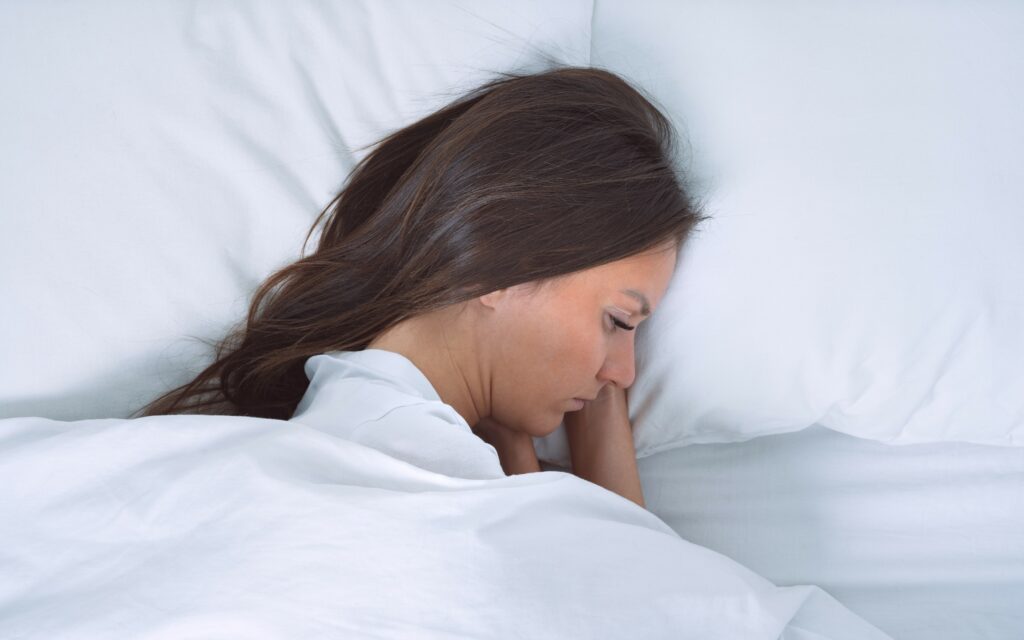Many of us rely on melatonin for some much needed slumber. The last thing you want is for it to lower your mood. So, can melatonin cause depression? Read on to learn what the research says.
When it comes to addressing issues like insomnia and sleep disorders, melatonin is one of the most common treatment methods. As a natural hormone produced by the human body, melatonin supplementation can be a very well-tolerated solution for sleep.
Unfortunately, concerns around melatonin and depression might prompt people to reconsider taking this medication. After all, if you’re already suffering from depression or low mood, a risk of higher instances of depression can be alarming. Numerous articles around the web suggest melatonin has the potential to increase, or worsen symptoms of depression.
However, the reality is these claims aren’t backed up by any significant scientific evidence. In fact, research into the question “does melatonin make you depressed?” actually reveals the substance could be an ideal solution for improving mood.
Let’s take a look at the facts about melatonin and depression.
Melatonin and depression: What is melatonin?
Answering the question “can taking melatonin cause depression?” starts with understanding what melatonin is, and what it can do.
Melatonin is a natural hormone produced by the pineal gland of the human brain. Its production is actually controlled by the “master clock” or circadian rhythm of your body. Exposure to light influence melatonin production heavily.
In most people, melatonin levels are naturally low throughout the day. However, as it gets darker, your optic nerve begins sending signals to the “master clock” which tells the brain it’s time to produce more melatonin. The increased levels of this hormone in your blood help you to feel sleepy.
While melatonin can assist with a range of crucial functions in the body, its most significant impact is usually on the sleep-wake cycle. The right balance of melatonin throughout the day helps to ensure you sleep when you’re supposed to, and feel awake through the day.
Often, melatonin is offered as a solution for common issues like:
- Insomnia
- Jet lag
- Shift work sleep disorders
- Circadian rhythm sleep disorder
- Delayed sleep phase disorder
- Sleep-wake disturbances
So, where does the connection between melatonin and depression come in?

Does melatonin make you depressed?
Though there are various articles indicating melatonin can cause temporary periods of depression, there’s actually no evidence to prove this claim. In fact, a 2016 review found no serious link between melatonin and depression.
Most of the research which indicates any negative link between melatonin and depression is observational only. A study in 2002 found people with depression may have slightly higher levels of melatonin.
Another 2006 report suggests people with depression may produce more melatonin at night. However, neither study shows melatonin actually causing depression.
There are no direct studies to answer the question “does melatonin cause mood swings?” However, some people believe the link between melatonin and depression might actually have something to do with the tiredness you may feel after taking melatonin.
After all, melatonin prepares your body for sleep, which create a feeling of “lack of energy” which people connect to the symptoms of depression.
What we can see from studies into melatonin and depression, is taking melatonin can actually be quite helpful. A report from 2018found resynchronizing the circadian rhythm with melatonin can help to alleviate depressive symptoms in patients.
In 2020, another study found melatonin symptoms significantly reduced depressive behaviors and symptoms, helping to get patients back on track with their sleep cycle. The better your sleep, the more likely you are to be able to handle the symptoms of depression.
What are the negative effects of melatonin?
While research into melatonin and depression is clearly limited, this doesn’t mean there aren’t any side effects associated with melatonin. Every medication, even something which mimics a natural hormone in your body, can have unexpected side effects.
In general, melatonin is relatively well-tolerated. However, it can cause issues like feeling sleepy or tired during the daytime. This could be problematic if your symptoms of depression already cause a sense of fatigue or low energy.
Other common symptoms can include dizziness, dry mouth, itchy skin, irritability, restlessness, or stomach ache. Some people get strange dreams or night sweats when taking melatonin, while some have issues with nausea.
In very rare cases, you might start to feel more confused or dizzy on melatonin, or suffer from blurry vision. While some companies do list “depression” or “low mood” as a side effect on melatonin supplements, this is backed up by limited data.
The reality is the link between melatonin and depression isn’t very well understood. Often, when asking “can melatonin cause depression”, confusion is caused by the link between feelings of fatigue or sleepiness, and the symptoms of depression.
Is melatonin good for anxiety and depression?
While research showing melatonin causing depression isn’t available, there are a lot of contradictory studies indicating the opposite. These reports suggest melatonin could assist with depression in a number of ways. The primary purpose of taking supplementary melatonin is to improve sleep.
Improving your sleep quality can significantly improve symptoms of depression, by helping to repair and revitalize the mind, and reduce depressive symptoms.
The more you sleep, the more resilient the emotional segment of your brain becomes. You may also find you’re less prone to mood swings. Various studies suggest melatonin can also reduce symptoms of depression in certain circumstances. For instance, one study from 2014 found melatonin could reduce the risk of depression for 3 months after breast cancer surgery.
Another 2017 review of clinical trials found melatonin improved the symptoms of depression in patients more than a placebo. In 2018, a review found melatonin supplements led to lower instances of depressive symptoms in certain patients.
One small study from 2006 also found melatonin might be very beneficial to people suffering from seasonal affective disorder (SAD). This condition involves symptoms of depression which follow a seasonal pattern. People with SAD often feel depression more during shorter days and colder months.
Researchers in this study found misaligned circadian rhythms are often a significant factor in causing seasonal depression symptoms. Low doses of melatonin – a substance effective at realigning circadian rhythms, seemed to help address this problem.

How to take melatonin with depression
The lack of available research into the connection between melatonin and depression can make it difficult to determine whether this substance is truly the right treatment for every case. Different people do have unique responses to different medications. This means you may encounter symptoms most people don’t get when taking melatonin.
The best way to ensure you get the right treatment for both your insomnia, and any depressive symptoms you might have at the same time, is to discuss your options with your doctor. If you’re currently being treated for depression, your doctor will take this into account when choosing your medication for sleep disorders.
We also know melatonin has a connection to our dopamine production and some people should be weary of this. Melatonin might lower dopamine production. People suffering from Parkinsons disease, dementia and restless legs syndrome, where dopamine plays a crucial role, should always discuss melatonin use with their doctor.
Some doctors will recommend skipping melatonin when taking certain substances like codeine, fluvoxamine, and central nervous system depressants. However, this is usually because of the sedative effects the combined substances can have. Melatonin can usually work well alongside a range of other treatments, without significant side effects.
In many cases, doctors will also recommend starting slow with your dosage when you’re taking melatonin. The same is true for virtually any sleep disorder treatment. Most people will start with between 1 and 3 milligrams of melatonin, so they can monitor their body’s reaction to the medication.
If you’re concerned about side effects and unwanted symptoms, it’s a good idea to keep an eye on your response to melatonin and share any issues with your doctor.
Can melatonin cause depression? The truth
So, can melatonin cause depression? The answer is “probably not”. There’s a lot of misinformation in the world today around melatonin and depression, simply because we don’t fully understand the impact melatonin can have on our body quite yet.
Research is still ongoing into melatonin and how it influences the mind, circadian rhythm and other factors. Because this substance can cause you to feel tired and sleepy, this sometimes leads to incorrect connections between melatonin and depression.
For the most part, however, the evidence seems to prove the connection between melatonin and depression is more good than bad. By re-aligning the circadian rhythm and improving your overall sleep experience, melatonin can help to reduce feelings of depression, and help give you more control over your emotions.
There’s no evidence melatonin will cure anxiety or depression on its own. However, it could be a valuable way to address some of the symptoms you feel.
As always, discussing your specific circumstances with your doctor will help to ensure you get the right treatment for your needs.
Siestio. Sleep Matters.
Now read these:
—Caffeine and melatonin
—Melatonin and Trazodone
—Rozerem vs melatonin
Medical disclaimer
You must not rely on the information provided on our website as an alternative to medical advice from your doctor or other healthcare professionals. For more information read our full disclaimer here.







